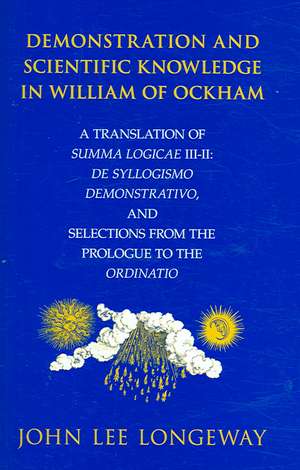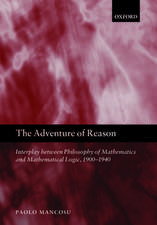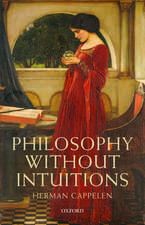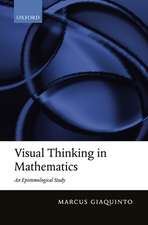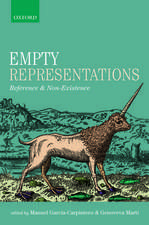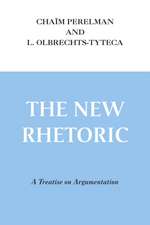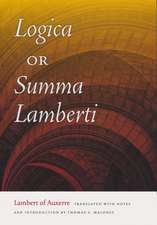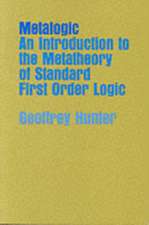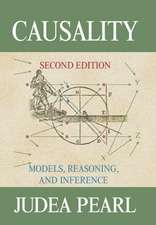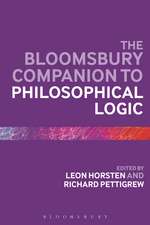Demonstration and Scientific Knowledge in Willia – A Translation of Summa Logicae III–II: De Syllogismo Demonstrativo, and Selections from the
Autor John Lee Longewayen Limba Engleză Hardback – 14 ian 2007
This book makes available for the first time an English translation of William Ockham's work on Aristotle's Posterior Analytics, which contains his theory of scientific demonstration and philosophy of science. John Lee Longeway also includes an extensive commentary and a detailed history of the intellectual background to Ockham's work in the Latin Middle Ages. Longeway puts Ockham into context by providing a scholarly account of the reception and study of the Posterior Analytics in the Latin Middle Ages, with a detailed discussion of Robert Grosseteste, Albert the Great, Thomas Aquinas, Duns Scotus, and Giles of Rome. In a series of appendices, Longeway includes shorter translations of some important related work by Giles of Rome and John of Cornwall.
In his introductory discussion, Longeway examines the exact character of the highest sort of demonstration (demonstratio potissima), the relations of the empirical sciences to mathematics, natural causation and the manner in which natural laws come to be known, the possibility of natural knowledge, our knowledge of God, and the relation of theology to the other sciences. Longeway discusses the way in which scientific epistemology and theory of demonstration corresponds to the metaphysical position of its interpreter, in particular to the Neoplatonism of Grosseteste, the radical Aristotelianism of Giles of Rome and Albert the Great, the more moderate Aristotelianism of Aquinas, and the nominalistic empiricism of Ockham. Throughout the book, Longeway makes a case for Ockham's importance as the founder of Empiricism in the West.
In his introductory discussion, Longeway examines the exact character of the highest sort of demonstration (demonstratio potissima), the relations of the empirical sciences to mathematics, natural causation and the manner in which natural laws come to be known, the possibility of natural knowledge, our knowledge of God, and the relation of theology to the other sciences. Longeway discusses the way in which scientific epistemology and theory of demonstration corresponds to the metaphysical position of its interpreter, in particular to the Neoplatonism of Grosseteste, the radical Aristotelianism of Giles of Rome and Albert the Great, the more moderate Aristotelianism of Aquinas, and the nominalistic empiricism of Ockham. Throughout the book, Longeway makes a case for Ockham's importance as the founder of Empiricism in the West.
Preț: 414.83 lei
Nou
Puncte Express: 622
Preț estimativ în valută:
79.39€ • 82.47$ • 65.94£
79.39€ • 82.47$ • 65.94£
Carte tipărită la comandă
Livrare economică 03-17 februarie 25
Preluare comenzi: 021 569.72.76
Specificații
ISBN-13: 9780268033781
ISBN-10: 0268033781
Pagini: 454
Dimensiuni: 156 x 234 x 25 mm
Greutate: 0.78 kg
Ediția:1st Edition
Editura: MR – University of Notre Dame Press
ISBN-10: 0268033781
Pagini: 454
Dimensiuni: 156 x 234 x 25 mm
Greutate: 0.78 kg
Ediția:1st Edition
Editura: MR – University of Notre Dame Press
Recenzii
“Longeway's claims are well-considered, and Ockham's influence on early modern philosophy is never far from his mind. His careful translation, compilation of relevant documents, and impressive history of medieval empiricism should interest any scholar studying the history of philosophy of science.”
“Longeway provides not only a very accessible translation but also extensive commentary of his own, including a book-length detailed history of the intellectual contexts of Ockham's Latin Middle Ages. . . . The result is an effective translation of Ockham's seminal work but also what may become a foundational text in intellectual and science history.”
Notă biografică
John Lee Longeway is associate professor at University of Wisconsin, Parkside. He is the author of William Heytesbury: On Maxima and Minima.
